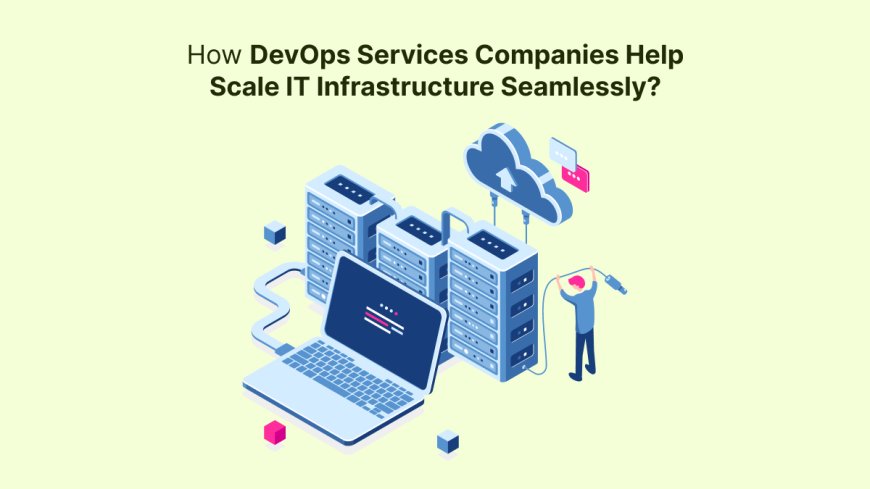How DevOps Services Companies Help Scale IT Infrastructure Seamlessly?
Discover how DevOps services companies help scale your IT infrastructure seamlessly with automation, continuous delivery, and secure, efficient operations.

In todays digital business landscape, companies rely heavily on their IT infrastructure to run smoothly and stay competitive. But as the business grows, handling that infrastructure can become more complex, expensive, and harder to manage. Thats where DevOps services companies step in. They offer a smarter, faster, and more reliable way to scale IT infrastructure without disruption.
DevOps combines software development (Dev) and IT operations (Ops) into one efficient process. This approach helps companies deliver applications and updates quickly, maintain stability, and improve productivity. When done correctly, DevOps not only boosts speed and performance but also prepares the entire IT setup for future growth.
This blog will explore how DevOps services companies play a crucial role in scaling IT infrastructure seamlessly. From automation and continuous monitoring to cloud integration and better team collaboration, lets break down how DevOps becomes a game-changer for modern businesses.
Understanding the Need to Scale IT Infrastructure
As businesses grow, so does the need for a more powerful and scalable IT system. Whether its handling more customers, supporting more apps, or processing larger data sets, your infrastructure must evolve.
But scaling isnt just about adding more servers or storage. It requires careful planning, efficient tools, automation, and proper monitoring. Without these, companies can face issues like downtime, slow performance, or unexpected system failures. DevOps services companies help businesses avoid these problems by introducing scalable practices and technologies that make the process smoother and more predictable.
What Do DevOps Services Companies Actually Do?
A DevOps services company offers expert solutions that bridge the gap between development and operations teams. They focus on automation, collaboration, and continuous delivery. Heres how they help:
- Automate repetitive tasks: This saves time and reduces human error.
- Improve deployment speed: They enable quick and safe software updates.
- Monitor performance continuously: This helps detect and fix issues early.
- Ensure system reliability: Through best practices and robust setups.
In simple terms, DevOps companies make your IT work smarter, not harder.
Automation: The Key to Scaling Smoothly
One of the biggest advantages of working with a DevOps services company is automation. Automating repetitive tasks like code integration, testing, and deployment ensures consistency and frees up your teams time.
Automation tools such as Jenkins, Ansible, and Terraform are used to manage infrastructure as code. This means your entire IT setupfrom servers to networkscan be created, scaled, or updated using scripts. It allows you to replicate environments easily, avoid manual errors, and scale up instantly when needed.
This speed and precision are essential when your business is growing, and you cant afford delays.
Continuous Integration and Continuous Deployment (CI/CD)
CI/CD is at the heart of DevOps. Continuous Integration means developers merge their code changes frequently into a shared repository. Continuous Deployment takes it further by automatically releasing those changes to production after passing tests.
DevOps services companies help set up reliable CI/CD pipelines. This approach allows businesses to roll out new features faster, fix bugs quicker, and respond to user feedback in real time. Most importantly, it ensures that changes are deployed without downtime or disruptions.
As your user base increases, CI/CD ensures your software delivery process remains fast and stableessential for scaling infrastructure efficiently.
Cloud Integration and Infrastructure as Code
Modern IT infrastructure is increasingly moving to the cloud. Platforms like AWS, Azure, and Google Cloud provide on-demand scalability, which means you can scale your computing resources up or down as needed.
DevOps companies help businesses migrate to the cloud and manage cloud resources efficiently using Infrastructure as Code (IaC). Tools like Terraform and AWS CloudFormation allow you to define your entire infrastructure through code.
This gives you the ability to spin up identical environments quickly, manage multiple environments across regions, and ensure consistency across deployments. Cloud-based scaling becomes easier, cheaper, and more manageable with DevOps experts guiding the process.
Monitoring and Logging: Staying Ahead of Issues
As your infrastructure grows, keeping an eye on everything becomes challenging. DevOps services companies implement robust monitoring tools like Prometheus, Grafana, ELK Stack, and Datadog.
These tools collect data in real time and provide insights into system performance, resource usage, and user behavior. By setting up alerts, you can catch problems before they impact customers. Logging also helps in troubleshooting issues faster and understanding the root causes.
When scaling, proactive monitoring ensures that your infrastructure can handle growth without hidden problems slowing things down.
Improved Collaboration Between Teams
DevOps isn't just about toolsits also about people and processes. A DevOps services company encourages collaboration between your development and operations teams. This removes silos, improves communication, and ensures that everyone is on the same page.
With shared goals, faster feedback loops, and common tools, teams work better together. This cultural shift leads to better software, faster delivery, and more scalable systems.
When your teams are aligned, scaling your IT infrastructure becomes much less stressful and more successful.
Security and Compliance at Scale
Security often becomes more complex as businesses scale. More data, more users, and more infrastructure can mean more vulnerabilities. DevOps services companies use a concept called DevSecOps, which means integrating security into every step of the development and deployment process.
Automated security scans, compliance checks, and vulnerability testing are part of the CI/CD pipeline. This ensures that as your infrastructure grows, it stays secure and compliant with industry regulations.
This approach avoids costly breaches and builds customer trustboth of which are vital for sustainable growth.
Cost Optimization Through Smart Resource Management
Scaling IT infrastructure doesn't mean throwing money at new servers or software. A good DevOps services company helps you use your resources wisely. Through cloud cost monitoring, automated scaling, and proper resource tagging, they help eliminate unnecessary expenses.
For example, you can set up auto-scaling so that you only pay for extra resources when you actually need them. You can also shut down non-production environments during off-hours. These small adjustments can lead to major cost savings, especially when scaling rapidly.
Read more: Why Your Business Needs Expert CloudOps Services for Seamless Operations?
Faster Time to Market
In business, speed matters. Whether youre launching a new product or responding to market changes, you need to move fast. DevOps speeds up the software development lifecycle through automation, testing, and continuous delivery.
With a reliable DevOps services company, your business can bring new products and updates to market faster than ever. This agility is a key competitive advantage in any industry and a major contributor to better growth and ROI.
Resilience and Disaster Recovery
When your IT systems grow, so does the risk of something going wrong. Thats why having a strong backup and disaster recovery plan is essential. DevOps services companies help build resilient systems that can recover quickly from failures.
Using automated backups, distributed systems, and fault-tolerant architecture, they ensure that your business stays onlineeven during unexpected issues. This resilience gives peace of mind and supports smooth scaling.
Conclusion
Scaling IT infrastructure isnt just about adding more servers or spending more money. Its about building systems that are efficient, reliable, and ready for growth. DevOps services companies make this possible by combining automation, cloud integration, CI/CD pipelines, and continuous monitoring into one seamless process. They bring the right mix of tools, processes, and people to help your business stay agile, secure, and cost-effective while scaling. More than just tech support, a DevOps company becomes a strategic partner in your journey toward smarter IT operations and business success.
Whether you're a startup expanding quickly or an enterprise managing massive systems, the right DevOps approach lays a strong foundation for future growth. Choosing to work with a trusted clone app development company that also offers DevOps services ensures you get both scalable technology and a digital edge to stay ahead of the curve.
FAQs
What is the main role of a DevOps services company?
A DevOps services company helps businesses automate their development and operations processes, improve collaboration, and build scalable, secure, and efficient IT systems.
How does DevOps support IT infrastructure scaling?
DevOps enables automatic scaling through tools like Infrastructure as Code, cloud integration, and continuous monitoring, making it easier to expand resources as the business grows.
Can DevOps reduce system downtime?
Yes, by using proactive monitoring, automated deployment, and quick rollback strategies, DevOps helps identify and fix issues faster, reducing downtime.
Is DevOps only for large companies?
No, businesses of all sizes can benefit from DevOps. Small and medium businesses especially benefit by improving their efficiency, agility, and time to market.
How do DevOps services improve security?
Through the DevSecOps approach, security is built into every phase of the development lifecycle with automated scans, compliance checks, and continuous monitoring.
































